New Releases
Review: Neighbors
 When a wild fraternity moves into the house next to Kelly (Rose Byrne) and Mac (Seth Rogen), a thirtyish couple with a new baby, they feel conflicted. Near constant noise and debauchery will disrupt the peace of their sleepy neighborhood and throw off their routine schedules, but truthfully they crave a little craziness. It wasn’t very long ago that they were carefree and in college themselves, and new parenthood is making them wistful for the past and afraid of becoming boring.
When a wild fraternity moves into the house next to Kelly (Rose Byrne) and Mac (Seth Rogen), a thirtyish couple with a new baby, they feel conflicted. Near constant noise and debauchery will disrupt the peace of their sleepy neighborhood and throw off their routine schedules, but truthfully they crave a little craziness. It wasn’t very long ago that they were carefree and in college themselves, and new parenthood is making them wistful for the past and afraid of becoming boring.
Desperate to avoid seeming like buzzkills (even though they really do want their young neighbors to just keep it down), they try to play along at first and even join the party one night. Real life makes it impossible for them to live in both worlds, though. Very soon, after a series of necessary-to-the-genre misunderstandings and mistakes, the situation has escalated quickly into all-out neighbor war.
Directed by Nicholas Stoller (Forgetting Sarah Marshall, Get Him to the Greek), the movie Neighbors has all the elements necessary to make it the next successful gross-out, slightly romantic comedy with arrested development undertones. However, thanks to a generally good-hearted script obsessed with pop culture and all-in performances from its stars (particularly Byrne as Kelly), Neighbors slightly exceeds expectations by throwing a few surprises into what could be just another immature prank-based film.
Not that Neighbors is smart, exactly, nor does it completely upturn traditional comedy cliches, but it does make an effort to gender equalize the situation. Byrne, who carries herself well throughout, channels the outrage of hundreds of minor female movie characters when Kelly shouts at her husband that it's not fair how he gets to be irresponsible and have all the fun while she is expected to be the bitchy mom whose only job is to scowl and complain. She makes a good point, and from then on not only participates in the shenanigans, she directs them.
Review: Jodorowsky's Dune
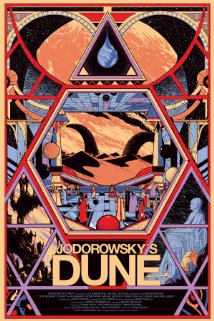 In the mid-Seventies, Chilean director Alejandro Jodorowsky, who was known for his radical arthouse films El Topo and Holy Mountain, took on the greatest challenge of his film career -- adapting for the screen one of the most classic sci-fi novels in history, Frank Herbert's Dune.
In the mid-Seventies, Chilean director Alejandro Jodorowsky, who was known for his radical arthouse films El Topo and Holy Mountain, took on the greatest challenge of his film career -- adapting for the screen one of the most classic sci-fi novels in history, Frank Herbert's Dune.
For two years, Jodorowsky worked an overwhelming number of hours with his creative team, including French comic-book artist Jean "Moebius" Giraud, screenwriter Dan O'Bannon (Dark Star, Alien), artist H.R. Giger (Alien), and sci-fi paperback illustrator Chris Foss to create over 3,000 storyboards and dozens of paintings along with incredibly detailed costumes and a tome of a script the size of a large phone book.
The film was to star Jodorowsky's own 12-year-old son, Brontis, who endured two years of daily martial arts training in preparation for his starring role alongside icons such as Orson Welles, Mick Jagger, David Carradine and Salvador Dali. Although the film was never made, it left an indelible mark on cinema with evidence throughout many sci-fi cult films of the last few decades including Blade Runner and Alien.
Director Frank Pavich reveals the impact of Jodorowsky's attempt in Jodorowsky's Dune, a fascinating and inspiring documentary about the greatest epic film that was never made. The movie opens Friday in Austin.
Pavich weaves interviews with the creative team involved in the massive project, including audio transcripts of the late Dan O'Bannon and supporters such as Drive director Nicolas Winding Refn and film journalists Devin Faraci and Drew McWeeny. Most importantly, we meet the charismatic and enthralling Jodorowsky himself.
Cinematographer David Cavallo creates an intimate portrait of Jodorowsky in the comfort of his home, setting the stage with images of his scripts, books, and feline companion. The animation by Syd Garon (Blackfish) is stellar, breathing life into the storyboards by Moebius and paintings by Giger that had me giddy with anticipation.
Interview: Frank Pavich, 'Jodorowsky’s Dune'
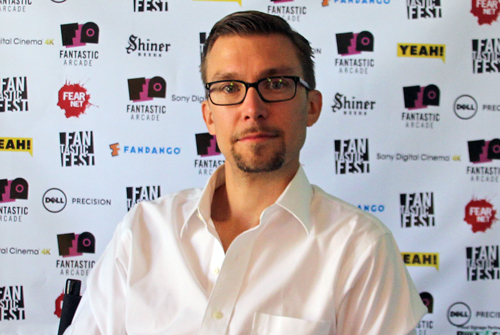 One of the most critically panned science-fiction films in history is Dune, directed by David Lynch in 1981. The rights to the film version of Frank Herbert's novel changed hands several times before Lynch's adaptation, with potential producers including Arthur P. Jacobs (Planet of the Apes) and Dino De Laurentiis.
One of the most critically panned science-fiction films in history is Dune, directed by David Lynch in 1981. The rights to the film version of Frank Herbert's novel changed hands several times before Lynch's adaptation, with potential producers including Arthur P. Jacobs (Planet of the Apes) and Dino De Laurentiis.
In 1975, arthouse cult filmaker Alejandro Jodorowsky secured the rights the Frank Herbert's Dune and began working on what would have been the most epic science fiction film ever created. Jodorowsky assembled creative geniuses and cultural icons from all over the world for the cast and music, creating his personal group of "spiritual warriors" for a two-year massive undertaking. Unfortunately, Jodorowsky's planned film and his story never truly made it beyond the storyboards until now.
At Fantastic Fest 2013, I met and spoke with director Frank Pavich, who brings to light the story of Alejandro Jodorowsky and his failed attempt to tell the mythical tale in his documentary Jodorowsky's Dune. Jodorowsky's treatment has been called "the greatest movie never made" for its influence on the science-fiction film genre. Here's what Pavich had to say during our time together.
Review: The Amazing Spider-Man 2
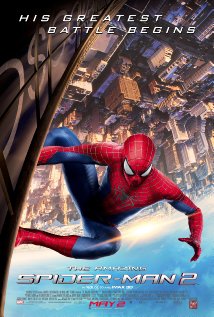 Swinging into theaters this weekend is the sequel to 2012's The Amazing Spider-Man. Scripted by Roberto Orci and Alex Kurtzman and directed by Marc Webb, The Amazing Spider-Man 2 picks up shortly after the reboot with returning stars Andrew Garfield, Emma Stone and Sally Field as well as Dane DeHaan and Jamie Foxx, both new to the series. The sequel exceeded my expectations as Garfield fell comfortably back into the title role.
Swinging into theaters this weekend is the sequel to 2012's The Amazing Spider-Man. Scripted by Roberto Orci and Alex Kurtzman and directed by Marc Webb, The Amazing Spider-Man 2 picks up shortly after the reboot with returning stars Andrew Garfield, Emma Stone and Sally Field as well as Dane DeHaan and Jamie Foxx, both new to the series. The sequel exceeded my expectations as Garfield fell comfortably back into the title role.
Peter Parker is just a teenager still trying to find his way less than a year after his powers have been thrust upon him. He has no school for gifted youngsters such as himself to provide peer support. He hasn't had a lifetime to come to terms with his powers under the guidance of a moral compass like Jonathan Kent. Only after the events with The Lizard has he had a chance to ponder the life ahead of him and its effects on those he loves.
Though some would say his on-again/off-again relationship with Gwen Stacy isn't true to the final shot of part 1, in which he throws caution to the wind, I think that reads too much into the scene. Sworn by her father to keep Gwen out of danger by avoiding her altogether, Parker is torn between his love and fear for her. Though like most any teenage boy he often feels invincible, self-doubt and uncertainty frequently win out as he is constantly reminded of the death of her father and his guilt over being unable to prevent it. Being Spider-Man provides his escape from or justification for his feelings over the death of Uncle Ben. Being with Gwen provides his escape from the responsibility of keeping an entire city safe.
Dane DeHaan is perhaps typecast as the rebellious, misunderstood teen vaulted into a position of power while suffering the mental ravages of abuse and neglect. His time on screen as Parker's childhood friend, Harry Osborn, is only background filler as he treads water until assuming his role as one of the seminal Spider-Man villains, Green Goblin. This is not Green Goblin's movie, however, and though the character's actions are pivotal, Green Goblin takes a back seat to the Electro storyline.
Review: Only Lovers Left Alive
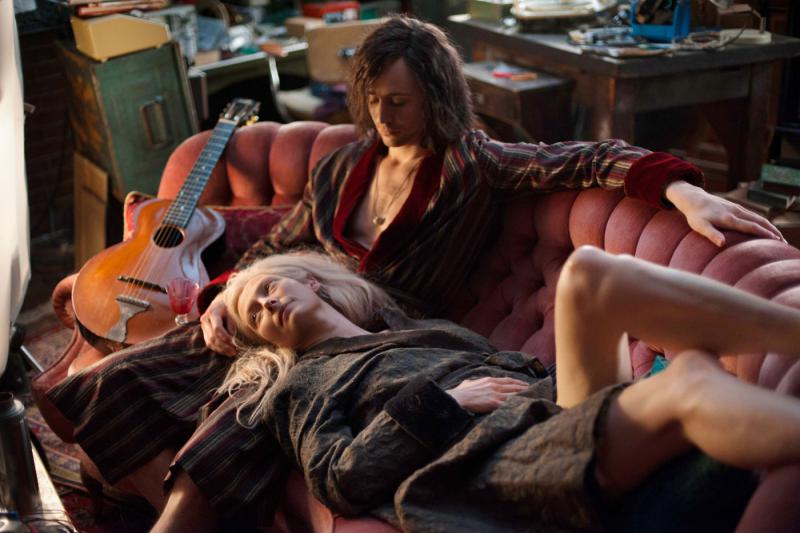
The allure of a seductive yet terrifying monster has always been the hook for me in vampire films. Usually an attractive immortal being who (in the sexiest way possible) preys upon its victims, leaving you both turned on but also scared out of your mind. I was prepared to see this happen again in Jim Jarmusch's latest film, Only Lovers Left Alive. Surprisingly though, it wasn't the case.
I'm not sure that I would classify this movie as a vampire film, but rather a romance story. I found myself longing for the type of relationship that Adam (Tom Hiddleston) and Eve (Tilda Swinton) share. Two creatures of the night that have been together for centuries, the film shows us what life is like for them in the modern world. And it's not what you'd expect: it's quiet and simple, although the two have more money than most average households. (I guess financial gain is a perk of being a vampire.)
Review: The Railway Man
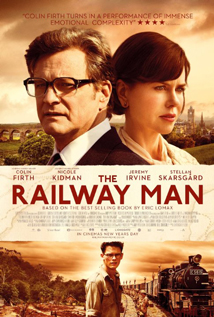 A particular subgenre I've enjoyed from an early age thanks to my father's influence is war movies, including the classics -- The Bridge on the River Kwai, Kelly's Heroes and The Dirty Dozen topped our list -- with a particular fondness for prisoner-of-war tales including Victory and Merry Christmas Mr. Lawrence. I find the stories of brave servicemen who overcome torturous emotional and physical conditions to be inspiring testaments to courage and bravery.
A particular subgenre I've enjoyed from an early age thanks to my father's influence is war movies, including the classics -- The Bridge on the River Kwai, Kelly's Heroes and The Dirty Dozen topped our list -- with a particular fondness for prisoner-of-war tales including Victory and Merry Christmas Mr. Lawrence. I find the stories of brave servicemen who overcome torturous emotional and physical conditions to be inspiring testaments to courage and bravery.
Directed by Jonathan Teplitzky, the movie The Railway Man portrays such a character, Eric Lomax (Colin Firth). It's based on the real-life story of a British army officer and radio engineer who was captured with his unit during the fall of Singapore in 1942. The prisoners of war were used to build the railroad from Burma to Siam through rough terrain, under brutal conditions.
The Railway Man begins with a chance encounter on a train between Eric Lomax and Patti Wallace portrayed by Nicole Kidman. After decades as a bachelor, Eric finds himself in love with the engaging Patti. After a whirlwind romance, they marry and settle into what would seem to be a quiet perfect life. However, Eric suffers from night terrors as he relives his wartime experiences including torture from Japanese officers, aided by their interpreter Nagase (Tanroh Ishida).
Patti seeks the aid of Eric's good friend Finlay (Stellan Skarsgard) to help her husband face his emotional demons -- not an easy task, as Finlay was also in Eric's unit and suffered from their captors' abuse. The men are bound by a code of silence, expected to endure and move on.
The story of their imprisonment is told in a series of extensive flashbacks with the young Eric (Jeremy Irvine) and a young Finlay (Sam Reid), nicknamed Uncle. Unbeknown to their captors, the men had smuggled in the parts to a radio which they reassemble in order to receive news from home. When the radio is discovered, Eric takes full blame and is subsequently tortured to confess what the Japanese believe is the true purpose for the radio.
Review: Cuban Fury
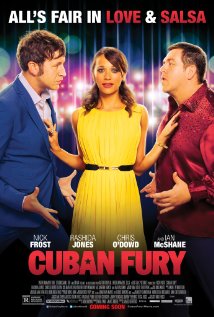 What better way to charm a lady than to display your dance moves?
What better way to charm a lady than to display your dance moves?
Nick Frost (Shaun of the Dead, Hot Fuzz) leads the cast in British dance-comedy Cuban Fury as Bruce, a middle-management type in a mechanical design office. His boss Drew, played quite creepily by Chris O'Dowd (The IT Crowd, Bridesmaids), constantly picks on him and won't stop with the fat jokes (seriously, enough with the fat jokes). Both men are excited by the entrance to the company of American executive Julia (Rashida Jones, Parks and Recreation, Celeste and Jesse Forever).
Bruce has a secret: He and his sister were once young Latin-dance superstars in their region, until an attack by bullies led him to put up his dancing shoes. To impress Julia, whom he spies taking salsa lessons, Bruce turns to his former dance coach Ron (Ian McShane, Deadwood) for aid. Bruce also gets help and advice from his bartender sister (Olivia Colman, Hot Fuzz, Broadchurch) and new dancing pal Bejan (Keyvam Novak, Four Lions, Syriana).
The plot is fairly predictable, with a few dance-offs thrown in. The choreography by Litza Bixler (Scott Pilgrim vs the World, Shaun of the Dead) is fast-paced and fun to watch. The dance battle between Bruce and Drew looks like it took some serious preparation.
The soundtrack is another of the better-executed facets of Cuban Fury, with Tito Puente classics and more modern Latin pop scoring the action. However, the bordering-on-sexual-harassment humor (along with the aforementioned proliferation of fat jokes) from O'Dowd's character was enough to make me grimace in my seat.
Review: Transcendence
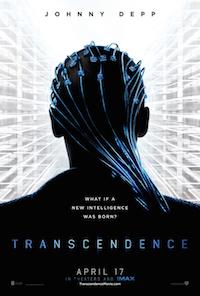 Wally Pfister has spent almost fifteen years as Christopher Nolan's go-to cinematographer. From Memento to The Dark Knight Rises, he's been behind the camera capturing incredible action-packed movies. For his directorial debut he chose a cyberthriller and packed it with terrific actors, even getting Nolan to serve as an executive producer. This is all quite an impressive pedigree for a first-time director, but it's also why the finished project, the movie Transcendence, feels so disappointing.
Wally Pfister has spent almost fifteen years as Christopher Nolan's go-to cinematographer. From Memento to The Dark Knight Rises, he's been behind the camera capturing incredible action-packed movies. For his directorial debut he chose a cyberthriller and packed it with terrific actors, even getting Nolan to serve as an executive producer. This is all quite an impressive pedigree for a first-time director, but it's also why the finished project, the movie Transcendence, feels so disappointing.
The story begins in the not-too-distant future with Max Waters (Paul Bettany) wandering around the chaotic streets of Berkeley, California. We learn there is no power and the phones are down thanks to an "unavoidable collision" of mankind and technology. After spending just a few moments in this dystopia, we flash back five years to try and understand why. Johnny Depp and Rebecca Hall play Will and Evelyn Caster, a research team and loving couple who specialize in artificial intelligence.
A series of deadly lab attacks happens across the country while the Casters are in the midst of giving a big donor presentation called "Evolve The Future." The FBI blames the actions on an organization called "R.I.F.T." (Revolutionary Independence From Technology), a group of hackers and activists who believe that artificial intelligence is a threat to humanity.
Cillian Murphy (Scarecrow from The Dark Knight Rises) plays the main FBI agent who meets up at the Casters' lab with fellow researcher Joseph Tagger (Morgan Freeman). He's the only survivor of their lab's attack because he neglected to eat a piece of poisoned birthday cake that was placed on his desk while he was deep in thought. They all introduce the FBI agent to PINN, a super-intelligent machine that basically operates like Siri on steroids.
Review: Joe
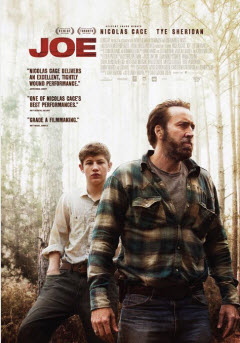 Filmmaker David Gordon Green has shot two films in Central Texas now (well, three, but only two are out yet), and he gets it. He really does. For both Prince Avalanche and now Joe, he took stories that could be set anywhere and ground them in local rural settings, with characters played by residents who weren't previously professional actors. The most affecting scene in Prince Avalanche was the one in the ruins with Joyce Payne.
Filmmaker David Gordon Green has shot two films in Central Texas now (well, three, but only two are out yet), and he gets it. He really does. For both Prince Avalanche and now Joe, he took stories that could be set anywhere and ground them in local rural settings, with characters played by residents who weren't previously professional actors. The most affecting scene in Prince Avalanche was the one in the ruins with Joyce Payne.
In Joe, I felt like I could drive 30 miles and find the unnamed town in which the film was set, with all its characters intact. In such a setting, the lead actors fit in and feel like characters, not stars. Even Nicolas Cage.
Cage plays the title character, whose job is leading a team of laborers to clear a forest for development -- hacking at trees with axes that contain poisonous liquids. He's approached by Gary (Tye Sheridan), a teenager in a family of drifters squatting in an abandoned shack. Gary wants to join Joe's work gang, needing money to help his family, because his perpetually drunk-and-enraged father (Gary Poulter) can't do it.
It's a simple story when I lay it out that way, but the story isn't the point here, it's the characters and the way they reveal themselves as the movie progresses, especially Joe. He's oddly passive at times, letting matters run their course in their own way. And yet some people and things affect him like dropping a match in gasoline. Don't even ask about the dog in the whorehouse. (That's a sentence I never expected to write.)
For someone who's seen too many hysterically overdone performances from Cage, his work as Joe is amazing, reminding us that when he's well directed in a well-written role, he's a marvel. He manages to portray a man keeping his passions under wraps and even when he does let loose, it's in a way that isn't histrionic. He doesn't dominate the film, either -- Sheridan holds up against him perfectly in their scenes together. But even in scenes with his work gang, or in a small grocery, the other characters get to shine.
Chatting with Nicolas Cage, David Gordon Green and the 'Joe' Cast
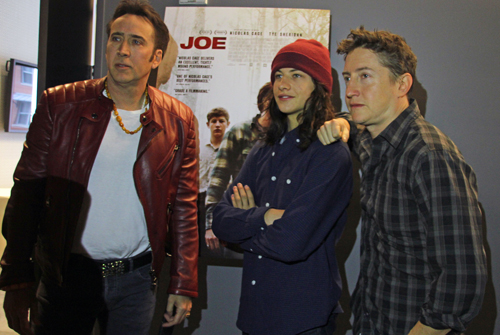
After a series of premieres across the country including SXSW and Dallas International Film Festival (DIFF), Joe opens today in Austin at the Violet Crown Cinema and Alamo Drafthouse Slaughter. Based on the novel by Larry Brown, this dark drama reveals the raw and often brutal nature of an impoverished family and what happens when a damaged man becomes involved in the family drama.
The leads of Joe are veteran star Nicolas Cage in the title role and Texas' up-and-coming young actor Tye Sheridan (Tree of Life, Mud) as Gary. Cage, Sheridan and Austin-based director David Gordon Green (Prince Avalanche) spoke to members of the press at a conference during SXSW last month. I also spoke with several cast members at the recent DIFF premiere.
Green said he was attracted to the script for Joe because it struck him as "a great contemporary western, a genre that I’ve always been drawn to." He was already familiar with Brown's novel, and had even worked on a documentary about the author.

